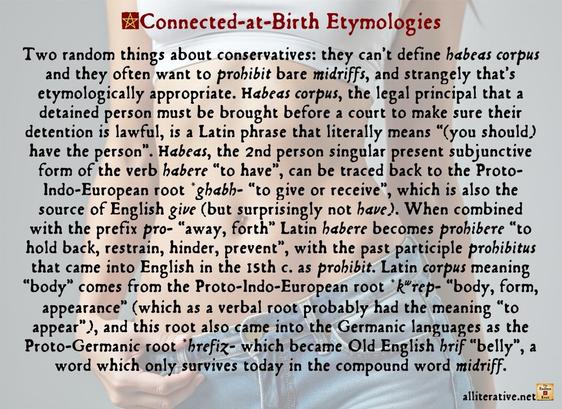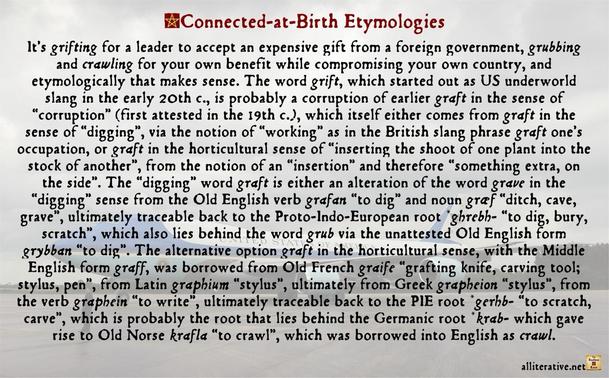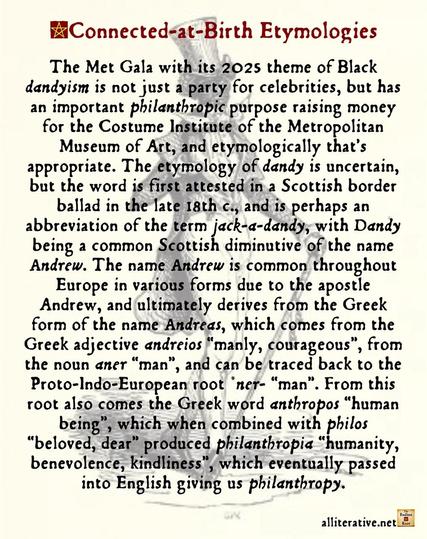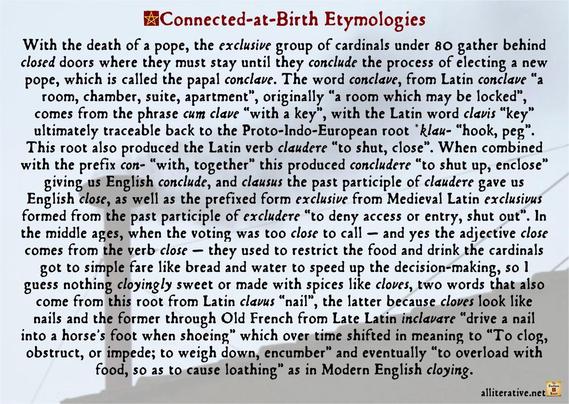The #ConnectedAtBirth #etymology of the week is HABEAS CORPUS/PROHIBIT/MIDRIFF #wotd #HabeasCorpus #prohibit #midriff
Videos & podcast about etymology, language, literature, history, science, & connections in the world around us. http://www.alliterative.net/
The #ConnectedAtBirth #etymology of the week is HABEAS CORPUS/PROHIBIT/MIDRIFF #wotd #HabeasCorpus #prohibit #midriff
The #ConnectedAtBirth #etymology of the week is GRIFT/GRUB/CRAWL #wotd #grift #grub #crawl
Happy #SherlockHolmesDay! One of our earliest videos was all about Holmes – and his connections to Sir Gawain and the Green Knight! https://www.youtube.com/watch?v=tGJ1fdAdn5w
#Etymology #Video #WordNerd #Linguistics #Language #Words #HistoricalLinguistics #LingComm #SherlockHolmes #Holmes #Gawain
Happy #DinosaurDay! Time to dig back into our past videos, for the early history of fossil hunting and paleontology’s roots: https://www.youtube.com/watch?v=x9yNwRBlKtU
#Etymology #Video #WordNerd #Linguistics #Language #Words #HistoricalLinguistics #LingComm #Dinosaur #Fossil #Paleontology
Happy #FlowerDay! Here are some lovely etymological blooms to help celebrate: https://www.youtube.com/watch?v=Q7Dpzgcm9jY
#Etymology #Video #WordNerd #Linguistics #Language #Words #HistoricalLinguistics #LingComm #Flowers
The #ConnectedAtBirth #etymology of the week is GRIFT/GRUB/CRAWL #wotd #grift #grub #crawl
Happy #LoveATreeDay! Have an arboreal etymology to celebrate! https://www.youtube.com/watch?v=Nl-WunKwjrY
#Etymology #Video #WordNerd #Linguistics #Language #Words #HistoricalLinguistics #LingComm #Tree
The #ConnectedAtBirth #etymology of the week is DANDY/PHILANTHROPY #wotd #dandy #philanthropy #dandyism #blackdandyism #MetGala #MetGala2025
Happy #LoveATreeDay! Have an arboreal etymology to celebrate! https://www.youtube.com/watch?v=Nl-WunKwjrY
#Etymology #Video #WordNerd #Linguistics #Language #Words #HistoricalLinguistics #LingComm #Tree
It’s #TulipDay! Beyond being a beautiful sign of spring, tulips are notable for being connected to one of the first market bubbles, and we have a short video about that.
https://www.youtube.com/watch?v=TELUATe2auc
#Etymology #Video #WordNerd #Linguistics #Language #Tulip #Bubble #Economy
It’s #WorldCocktailDay! So what better time to pour yourself a drink and settle in to learn all about the history of the cocktail, and some of the fascinating connections of some iconic drinks, with our Cocktail playlist!
https://youtube.com/playlist?list=PLlDwZNRMgsJK9YKaDhE7Gl-xQ_O2Ur8ZC
#Etymology #Video #WordNerd #Linguistics #Language #Words #HistoricalLinguistics #LingComm #Cocktail
The #ConnectedAtBirth #etymology of the week is DANDY/PHILANTHROPY #wotd #dandy #philanthropy #dandyism #blackdandyism #MetGala #MetGala2025
Happy #LimerickDay! In lieu of a (bad) limerick of our own, we’ll point you to our video about Verse, which talks about the basics of poetic form, including the limerick: https://www.youtube.com/watch?v=SxFzgH0y9Jw
#Etymology #Video #WordNerd #Linguistics #Language #Words #HistoricalLinguistics #LingComm #Limerick #Verse #Poetry
Happy #NationalTeacherDay! Thank you to all the teachers whose work is so important. To mark the day, here’s our video on the etymologies and history of education: https://www.youtube.com/watch?v=fR0YVsr8QhU #NationalTeachersDay #TeacherAppreciationDay #TeacherAppreciationWeek
#Etymology #Video #WordNerd #Linguistics #Language #Words #HistoricalLinguistics #LingComm #Teachers #Education
The #ConnectedAtBirth #etymology of the week is CONCLAVE/EXVLUSIVE/CLOSE/CONCLUDE #wotd #conclave #exclusive #close #conclude
For #NationalTourismDay, may we direct you to our video about the Olympics, Amateurs, and – it turns out – tourism? https://www.youtube.com/watch?v=im0C18vcyFE
#Etymology #Video #WordNerd #Linguistics #Language #Words #HistoricalLinguistics #LingComm #amateur #olympics #tourism
Happy #NationalTeacherDay! Thank you to all the teachers whose work is so important. To mark the day, here’s our video on the etymologies and history of education: https://www.youtube.com/watch?v=fR0YVsr8QhU #NationalTeachersDay #TeacherAppreciationDay #TeacherAppreciationWeek
#Etymology #Video #WordNerd #Linguistics #Language #Words #HistoricalLinguistics #LingComm #Teachers #Education
The #ConnectedAtBirth #etymology of the week is CONCLAVE/EXVLUSIVE/CLOSE/CONCLUDE #wotd #conclave #exclusive #close #conclude
It’s #NationalCartoonistsDay! Here’s our video “Marvel” about the history of comics and cartoons, to celebrate! https://www.youtube.com/watch?v=R_V7GSoi314
#Etymology #Video #WordNerd #Linguistics #Language #Words #HistoricalLinguistics #LingComm #Marvel #Comics





